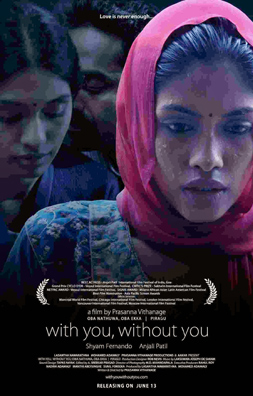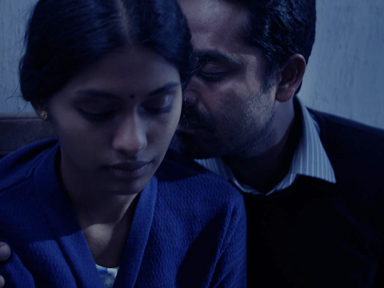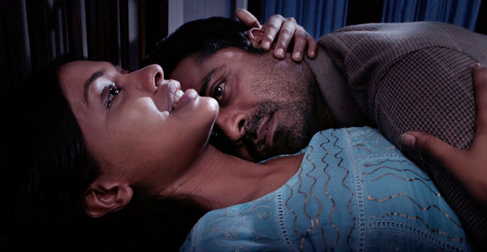|
MOVIE
Oba Nathuwa Oba Ekka:
A portrait of an unbridgeable gulf
Reviewed by Maximus Jayantha Anandappa
|

Prasanna Vithanage wikimedia.com |
Prasanna Vithanage’s award winning ‘Oba Nathuwa Oba Ekka’ (‘With you,
without you’) will sit comfortably with the most subtle and captivating
cinematic creations of our time. Since seeing this movie in Sydney last
year, I have not stopped savouring its haunting moments, its underlying
power and the relevance of its theme.
My esteem of Vithanage had been somewhat dented after his somewhat
jejune ‘Akasa Kusum’ (2009), I nearly gave the film a miss when by
chance I noted that it was based on Fyodor Dostoevsky›s novella ‘The
Meek One’ or ‘A Gentle Creature’. This minor work of the Russian master
had eluded me and I had no clue about his work or what to expect on the
screen.
Lack of the synopsis of the film made watching it an intriguing,
absorbing and a thoroughly rewarding experience. The film’s abrupt
ending had such a profound effect on me - it almost moved me to tears
and compelled me ask myself: why did the film end like that?
Impressed by the topicality of its theme in relation to the ethnic
gulf and ethnic prejudices, I was certain that the film must be a loose
adaptation of Dostoevsky’s novella.
I was astonished when I read the book. Vithanage had stuck to the
Russian master’s story diligently. He had substituted the heroine – the
meek one with a destitute young Tamil girl and changed the backdrop to
the post-war period- a brilliant ploy indeed.
Allow me to first sketch the storyline of ‘Meek One’. This will
demonstrate Vithanage’s brilliance and to what extent he had relied on
Dostoevsky’s sharp insight- a major reason for the film’s expressive
power.
 ‘Meek One’ (1876) though obscured by his more famous work, is
typically Dostoevskian in its depth of psychological observation and
power - the story containing a range of themes common to his major
works. ‘Meek One’ (1876) though obscured by his more famous work, is
typically Dostoevskian in its depth of psychological observation and
power - the story containing a range of themes common to his major
works.
Cruelty, freedom, utopianism and suicide are the themes that recur in
‘Meek One’ - those who saw the film will instantly recognize these
themes.
Dostoevsky’s Nameless Meek One
‘Meek One’ chronicles the relationship between a 41-year-old unnamed
pawnbroker (a retired lieutenant who gives up his Commission having
refused to fight a duel) and a 16-year-old poor orphaned girl who
frequents his shop to pawn her virtually worthless goods. The pawnbroker
(the narrator) develops an interest in the girl and makes a marriage
proposal, which the young orphan girl in dire straits accepts.
She
has been living in near slavery with two of her hostile aunts and is
about to be ‘bartered’ as a bride to a much elder widowed shop owner
looking for a mother for his young children after some failed marriages.
The pawnbroker is delighted that the girl has no choice but to
accept his money and his magnanimity. He is (wickedly) pleased with his
prospects and her helplessness and with a sinister reflection that he
was forty one and she was only sixteen. “That fascinated me” tells the
narrator in typical Dostoevskian insight: “That feeling of inequality
was very sweet, was very sweet”.
The marriage starts out cordially enough, but the pawnbroker’s
miserly uncompromising ways are too much for his delicate wife.
Disagreements about how the pawnshop should be run result in
arguments. The narrator’s wife starts digging into his past to find out
his shameful departure from the regiment. Unable to cope with his ways,
she is driven to the point of trying to shoot him. One morning, half
awake, the narrator realises that his wife is standing near him with a
revolver pointed at his forehead. He closes his eyes and pretends that
he is asleep, but he is convinced that he had conquered her by showing
her his readiness to accept death.
She does not shoot. That same day she becomes ill.
Fearing losing his wife the pawnbroker nurses her dutifully. She
recovers. A watershed moment of their relationship happens when she
begins to sing in his presence. The pawnbroker kisses his wife’s feet
and promises to be a changed man. He recounts the story of his shame in
the regiment, and promises to take her overseas. Several days later, the
narrator leaves the house to make arrangements for travel.
When he returns home the narrator is met with a crowd of people
outside his house. His wife has committed suicide: she has jumped out of
the window holding her icon. The narrator is regretful of her death and
the delay in his arrival but it was ultimately his narcissistic love
that drove his gentle wife to suicide. According to him he was only
“just five minutes too late”.
The story is written as a muddled confessional flashback from the
point of view of the confused pawnbroker immediately after the suicide
while the dead body is still in the room. Vithanage has retained this
narrative technique and to his credit Dostoevsky’s tone. The suicide is
a surprise ending in the movie.
Vithanage’s Gentle Creature: Selvi’s Story
In a masterstroke Vithanage has substituted the nameless 16-year-old
orphan girl with a destitute young Tamil girl Selvi (Anjali Patil).
During the times of war she had made the journey from the war-torn
Killinochchi to Bogawanthalawa to live among the upcountry Tamils in
relative safety. Her two young brothers had been killed by the army and
parents had feared that she could get raped by the Army. War is over
now.
Selvi had lost her parents and has no home to return to, no future
and she is a huge burden and a nuisance to her down-trodden Aunts in
spite of doing her bit to help them and their kids. The pawnbroker is a
guilt ridden ex-soldier Sarathsiri (Shyam Fernando) who lives in
self-exiled style guarding a secret and with a utopian expectation of
accumulating wealth to buy a vast tea estate.
|

youtube.com |
Crushed by poverty, Selvi too keeps bringing her worthless goods to
the pawnshop and catches the eye of Sarathsiri. A marriage proposal is
made through his maid Lakshmi (Maheswari Ratnam), which she accepts for
identical reasons. Cohabitation starts. The girl blooms in happiness,
expectations and love. There is no reciprocation of love. Sarathsiri is
aloof, engrossed in how to make a fortune from his pawnshop and watches
wrestling fights on television as a pastime. He tells his young wife
about his single minded ambition to purchase the vast tea planation that
is overlooking his dungeon like shop which is also their family home
now. Like Dostoevsky’s pawnbroker Sarathsiri too was not going to bribe
her with love.
In the tastefully constructed sexual union scene Vithanage shows how
flimsy and brutally one sided the relationship is. There is no foreplay-
no tenderness- no love- no intimacy. The young wife has no choice but to
submit to the torture.
Sarathsiri’s closely guarded secret, his ex-Army background gets
exposed unexpectedly when one of his former army colleagues Gamini (Vasantha
Moragoda) makes a sudden appearance. Confrontation between the
mismatched couple starts in earnest. Selvi announces that she would have
never married him if she knew his true background and that two of her
brothers were killed by the army. She also tells him that she had to
leave her parents due to fear of getting raped. In her eyes Sarathsiri
is a villainous ex-Sinhala soldier who had killed Tamils and now an
unscrupulous pawnbroker exploiting the poor (Tamils again) in a lopsided
moneylending trade. She does not hold back her views. Sarathsiri defends
himself that if not for him she would be starving.
Then there is also the revolver scene (less convincing than the
book), followed by Selvi getting sick, her recovery, the singing scene,
attempt for reconciliation and Sarathsiri’s confession explaining his
self-exile and guilt and his connection with Gamini. He had falsified
evidence to protect some fellow soldiers including Gamini who had been
accused of raping and killing a Tamil girl. He had left the army in
indignity for having to lie. The confession is the final nail on the
coffin. It punctures the vulnerable relationship irretrievably. Selvi
heads into a bout of depression. Realizing that he might lose her,
Sarathsiri cares for her and plans to take her to India by selling his
business as soon as she shows signs of recovery. He is prepared to start
a new life; the relationship is breached beyond repair.
One day Selvi says that she is sorry that she had failed to be a
matching wife to Sarathsiri and promises to make amends. Overjoyed
Sarathsiri kisses her from head to toe and leaves to buy air tickets for
India. Selvi starts praying. She has made her decision about their
future and how to end her agony which is shown to a devastating effect
to a stunned audience.
The Unbridgeable Gap?
Vithanage’s tight script, directional skills, the economy in
sketching his characters and the sympathetic portrayal of human nature
is all in full display in the movie. Dialogues are minimal but the
effect is powerful and profound. So too is Laxman Joseph de Saram’s
lingering musical score. The plaintive melodic phrase played softly on
the keys of a piano in a very slow tempo almost like a largo, was in
perfect sync with the sad mood of the story. It also interspersed
beautifully with the tone of the mournful narration and the imagery. As
customary with his previous works, the cinematography (M.D. Mahindapala)
with some iconic shots and the editing (Sreekar Prasad) are at their
best, though the repetitious nature of Selvi frequenting the pawnshop
could have been curtailed a bit at the beginning. I am loath to complain
much though.
|

youtube.com |
Shayam Fernando as the guilt ridden ex-soldier looked authentic. His
diction and the tone of voice full of repentance and remorse surely
added significantly to the somber atmosphere of the film and to its
overall appeal.
Anjali Patil the Marathi speaking Maharashtra born actress was even
more impressive and convincing as Selvi. I was amazed to learn that
Patil had done her own dubbing completely by herself which makes her the
first Indian actress to dub in Sinhala language. Her fresh face and the
Sinhala diction with a slight “Tamil accent” to me is another
masterstroke of Vithanage. Her performance won her the best actress
award in an International Film Festival in India in 2012. The film
having been co-produced by Lasantha Nawarathna and Mohamed Adamaly (Aakar
productions India) choice of an Indian actress must have increased its
marketability in India- a forward step by Vithanage to overcome the
limitations in the local market.
Dostoevsky’s “Meek One” was doomed to perish because the pawnbroker
decides from the start of the marriage to be “stern” with her and to
taunt her on his generosity and withhold love and affection. Vithanage’s
poor defenceless Selvi full of innocence and eagerness and with a tragic
past too is doomed to perish. Sarathsiri makes absolutely no effort to
bridge their gap or sympathise with her. He too cherishes his
superiority and their inequality. As if preordained, circumstances had
forced the hapless girl to unknowingly strike a relationship with an ex-
soldier with a dodgy past. Continuing to live with that ex-soldier would
have been a huge scuffle against her conscience. She is too candid to
deal with this. There is no respite or escape for the poor girl.
It is clear that Vithanage is using the doomed relationship between
the ex-solider and the orphaned Tamil girl as a motif to figuratively
portray the unbridgeable gulf that seems to exist between the Sinhala
and Tamil communities- a gulf that has widened with decades of war. The
analogy has given an exceptionally powerful ending to the film and food
for thought. Though the title in English is less suggestive, in Sinhala
it is unmistakable in alluding to the cause of the strife. “Oba Nethuwa
Oba Ekka”- suggesting something like: “Well, I am happy to cohabitate
with you but without really accepting you as you are- as my equal”. In
more simplistic terms, therein also lie the essential duplicity of the
Sinhala Tamil relationship and the aversion of the Sinhalese to accept
the Tamils as their equal. The recent brutal history has not helped to
bridge this gap. Wounds must heal first.
Lovers of serious art will no doubt enjoy seeing this beautifully
crafted hauntingly powerful masterpiece and for their sake I am happy
that the censors have spared the film without any cuts.
(The reviewer is
based in Sydney and can be contacted on
[email protected])
|

